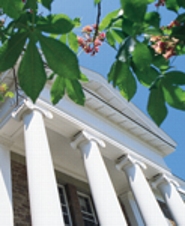
Hamilton College has been awarded a $250,000 grant from the Arthur Vining Davis Foundations to support the three-year pilot phase of a comprehensive First-Year Experience (FYE) program to help students make the transition to college.
According to the proposal, “A coordinated FYE will instill an immediate sense of belonging in students and will provide the necessary academic and social foundations for their success at Hamilton College. Many students struggle, especially in their first semester, to balance and manage the social and academic demands of college. As Hamilton achieves even greater diversity in its student body, transitional issues will require even greater attention. To that end, we have developed a first-year program that intentionally connects the residential, advising and classroom experiences.”
The Davis Foundations grant will be used to support the establishment of first-year courses, add an associate dean of faculty position and provide support for summer advising.
Meredith Harper Bonham, senior associate dean of students for strategic initiatives, said, “The Arthur Vining Davis Foundations grant will kick start Hamilton's First-Year Experience program, especially on the academic side. In providing support for the establishment of an associate dean of faculty position, the Foundation recognizes the need to create an administrative point person who will be an invaluable resource for faculty interested in teaching first-year courses,” Bonham explained. “I look forward to partnering with that individual in order to launch a program that will enhance our students' transition to college.”
Also as part of the FYE program, Hamilton plans to raise and/or invest the resources necessary to renovate and reconfigure six existing residence halls to accommodate first-year clusters. Housing first-year students together will create an immediate sense of community while also encouraging class unity, and providing an essential anchor of stability for those experiencing adjustment challenges, according to the proposal.
The College also plans to expand the Residential Engagement in Academic Life program, offering approximately 100 (or roughly one quarter) of first-year students the option of living in a cluster while sharing a common academic experience by taking one of several specific seminar classes.
The proposed first-year courses will focus on at least one of three areas for which Hamilton has stated standards for academic work: writing, oral communication, and quantitative and symbolic reasoning. In addition to introducing students to disciplinary practices, each course will also examine its place in the context of a liberal arts education.
The two structural changes -- summer registration and appointment of a new associate dean of faculty charged with encouraging, promoting and organizing faculty involvement across the disciplines -- would help ensure that the FYE in general, and the first-year courses in particular, are woven strongly into the curriculum. A proposed summer registration process will lessen the stress of the course registration process during orientation, and also enhance pre-concentration advising.
The new associate dean of faculty will have substantial responsibility for coordinating all academic aspects of the FYE. He or she will take the lead role in encouraging faculty across academic departments to participate in the FYE, especially in teaching first-year courses.
